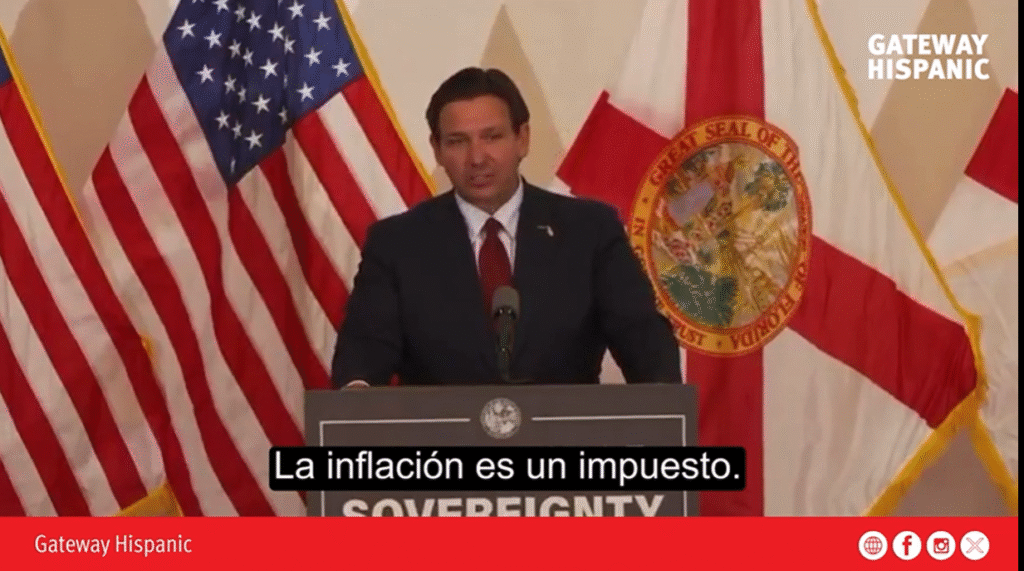The United States economy is facing one of its most pressing challenges today: persistent inflation that continues to erode the purchasing power of millions of hardworking American families. While the federal government refuses to implement real spending cuts, the dollar weakens, prices rise, and promises of stability vanish under the weight of irresponsible policies. For Florida Governor Ron DeSantis, this isn’t merely a natural economic fluctuation—it’s an indirect tax imposed on citizens by a Congress unwilling to practice fiscal discipline.
DeSantis’ analysis is not only accurate but deeply resonates with the foundational principles of the Republican Party: responsibility, austerity, and the defense of economic freedom. When the government spends more than it earns and covers the deficit by printing money or increasing debt, the result is widespread price hikes that hit the poorest Americans the hardest. This inflation, though not codified as a formal law passed by Congress, has the same devastating impact as a direct tax—it reduces your buying power, eats away your savings, and punishes wage earners.
Despite the warnings, neither Congress nor many political elites seem willing to acknowledge the scale of the problem. Federal spending continues to rise uncontrollably, feeding bloated budgets, inefficient programs, and subsidies that distort the market. This reality is ignored even by Republican lawmakers who have promised to control the deficit but have yet to implement a single significant federal spending cut.
In this context, DeSantis’ proposals gain strength. He urgently calls for a constitutional amendment that would require the federal government to operate under a balanced budget. Most U.S. states already function under this principle: you can’t spend more than you earn. If families and small businesses live by that rule, why shouldn’t Washington? For DeSantis and many conservatives, such an amendment would be the first concrete step toward a smaller, more efficient, and ultimately fairer government.
This is more than a fiscal debate—it’s a matter of public trust. How can American voters trust a Congress that preaches fiscal restraint while indebting the country by trillions? How can we speak of social justice when the value of money is allowed to deteriorate, salaries stagnate, and the price of basic goods skyrockets?
Inflation does not affect everyone equally. For the wealthy who hold appreciating assets, rising prices may translate into gains. But for ordinary citizens—for the father filling up his gas tank, for the single mother buying groceries, or for the retiree living on a fixed pension—every penny lost to inflation is a direct hit to their quality of life. This is why DeSantis insists that the fight against reckless spending is not just ideological—it’s a moral imperative.
Elon Musk, too, has voiced concern over the unchecked expansion of federal spending. Despite constant attacks from progressive media and ideologues, he represents an influential voice in favor of moderation and fiscal responsibility. Alongside DeSantis, he highlights the dangers of an ever-expanding state. Yet, as the Florida governor points out, there has been no real congressional response. Even after Memorial Day, not a single concrete budget cut has been implemented. The federal machine continues, fueled by inflation that every American ultimately pays for.
For many conservatives, this situation demands more than speeches—it demands action. The time for complacency is over. Elected representatives must act with consistency. If they’ve promised to rein in spending, they must deliver. If they’ve identified unnecessary programs, they must eliminate them. And if they recognize that inflation acts as a hidden tax, they have a moral duty to stop it immediately.
In the upcoming elections, fiscal policy must not take a back seat—it must be front and center in the national conversation. The proposal for a balanced budget amendment, championed by DeSantis and supported by other Republican leaders, could mark a turning point in how Americans understand the role of their federal government. The United States doesn’t need more empty promises or more inflationary stimulus. It needs leaders who are willing to tell the truth, make hard decisions, and restore the fiscal responsibility that once defined Congress.
Because at the end of the day, every dollar printed without backing, every unchecked debt, and every budget passed without realism becomes a burden on the American worker. The era of complacency is over. It’s time to defend the nation’s economy with the same conviction we defend its Constitution.
Read the full article here


